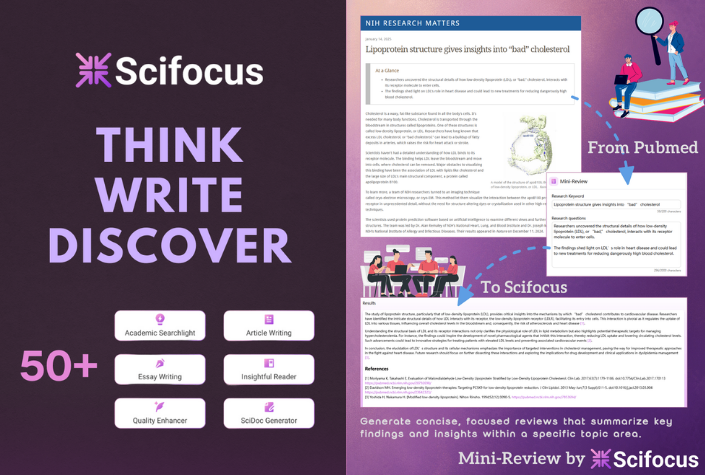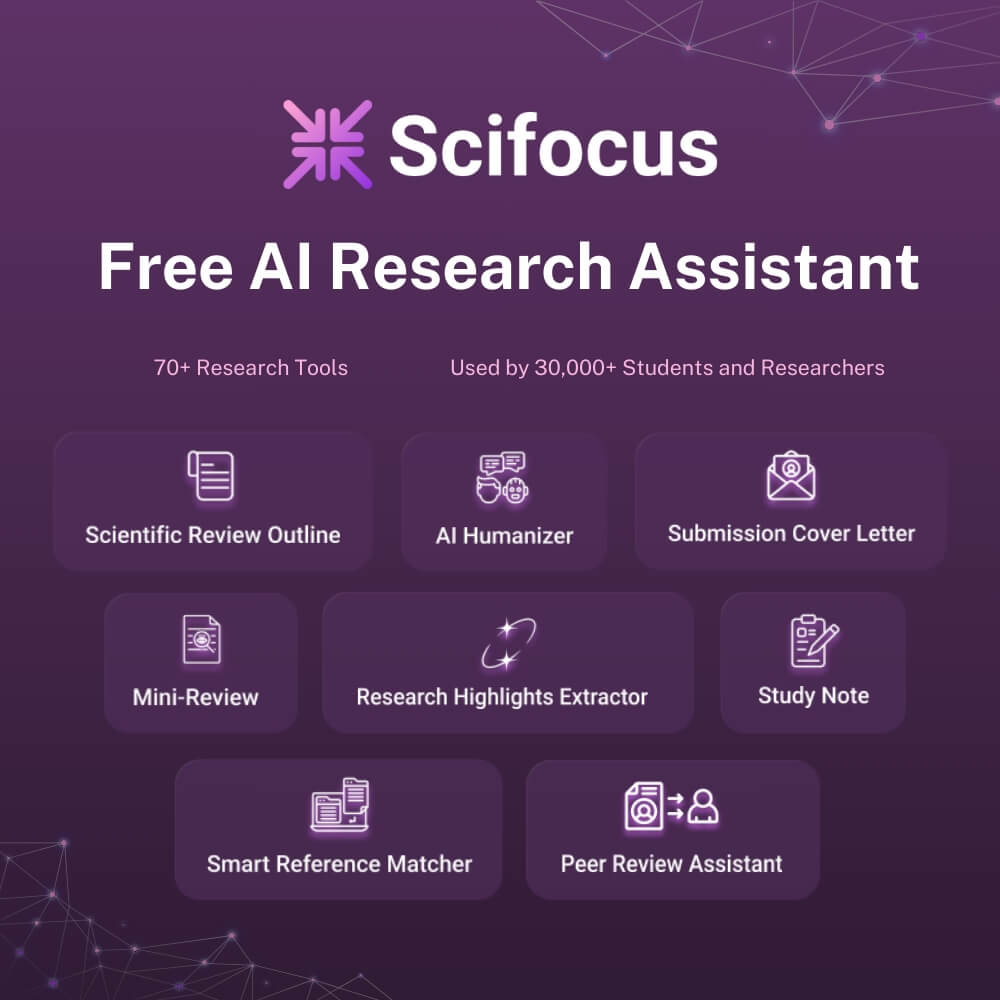Discover the 10 Best AI Tools Transforming Scientific Research in 2025

Sofia Martinez
7 min read · Mar 4, 2025
As the realm of scientific inquiry transforms, the transition towards online tools has unveiled a vast array of resources that can significantly enhance the productivity and efficacy of scientific endeavors. The challenge lies in pinpointing tools that augment your research without complicating your workflow. While navigating through this vast ocean of resources, several key factors should be considered:
User-Friendliness: Choose tools with user-friendly interfaces.
Artificial Intelligence: Seek out AI integration to automate and improve research tasks.
Data Protection: Verify adherence to the latest data security and privacy regulations.
Software Compatibility: Prefer tools that provide seamless integration with existing systems.
Precision: Confirm that the tools deliver accurate and reliable information.
No-Cost Access: Ensure that there is a truly free option available, rather than merely a trial period requiring future payments.
With these criteria in mind, let us delve into ten complimentary online tools that could become indispensable for your scientific research.
- Scifocus - Best AI Research Assistant Overall
- Semantic Scholar
- Connected Papers
- Scholarcy
- Consensus
- Research Rabbit
- Audemic.io
- Zotero
- Protocols.io
- SciNote ELN
Scifocus - Best AI Research Assistant Overall
Scifocus takes the lead as an innovative AI-driven platform tailored to meet the needs of researchers in the scientific domain. The platform integrates large AI models, proprietary knowledge bases, and public academic database interfaces to deliver comprehensive support across the entire research process. This includes academic search, paper writing, literature management, and efficiency enhancement.
With advanced academic retrieval tools, Scifocus provides precise and efficient responses to complex queries, saving significant time on literature searches. The platform also excels in academic writing, offering tools for generating outlines, refining drafts, and optimizing final manuscripts for clarity and impact.
Scifocus further supports researchers by summarizing and extracting key insights from academic documents, creating concise abstracts for efficient literature management. Personalized recommendations based on research interests help users discover emerging opportunities, making Scifocus a valuable tool for innovation in scientific research.
Scifocus offers a comprehensive suite of academic writing tools designed to ensure precision, excellence, and efficiency in every stage of the writing process. By going beyond mere content generation, Scifocus provides advanced functionalities that enable users to structure, refine, and perfect their academic papers with ease. One standout feature is its automated paper structuring capability, which allows users to generate detailed outlines and experimental designs tailored to their specific research needs. This ensures a logical flow and scientific rigor from the very beginning. Additionally, Scifocus simplifies the complexities of scholarly writing by helping users create well-organized, high-quality content that adheres to the strictest academic standards. For more specialized writing tasks, such as drafting abstracts, conducting peer reviews, or tackling intricate research papers, Scifocus offers expert guidance and tailored support to address these challenges effectively. To further enhance the quality of academic outputs, the platform includes built-in tools to ensure impeccable citations and formatting, ensuring compliance with publication standards. These features collectively empower users to produce publication-ready papers with confidence, setting a new benchmark for academic writing excellence in the scientific research landscape.
Pros:
- Enhanced Academic Transparency: The tool provides translation annotations and side-by-side comparisons, ensuring accuracy and maintaining academic integrity.
- Optimized Academic Keywords: Scifocus generates standardized and relevant keywords, improving the logical structure and citation potential of research papers.
- Customization for Style Guides: Whether you’re adhering to APA, MLA, or Chicago formatting, Scifocus tailors your text to meet specific style requirements.
- Time-Saving Efficiency: By automating complex proofreading tasks, Scifocus allows researchers to focus on their work without worrying about linguistic or stylistic inconsistencies.
Cons:
- Specialized features may require user familiarization.
Semantic Scholar
Empowered by AI, Semantic Scholar is a free, nonprofit research tool that distinguishes itself with its intelligent search functionalities. It navigates through millions of publications to present you with the most pertinent and impactful studies, significantly reducing the time typically spent on literature review. With an emphasis on AI, Semantic Scholar provides tailored recommendations, citation summaries, and key phrase extractions that simplify staying abreast of the latest developments in your field.
Connected Papers
Connected Papers presents a unique visual perspective on research, constructing an interactive graph that illustrates the relationships between scientific papers. It’s akin to possessing a bird’s-eye view of the research landscape, enabling you to trace the evolution of ideas and their interconnections. This can reveal crucial papers that might otherwise be overlooked.
Scholarcy
Scholarcy acts as your AI-powered reading assistant, clarifying complex academic papers by distilling them into manageable summaries. Envision having the capability to grasp the central themes and conclusions of a dense, 30-page document within mere minutes. Scholarcy makes this feasible, emphasizing the methodology, results, and discussions that are vital for comprehending the paper’s contribution to the field. This tool is ideal for researchers with time constraints who need to remain ahead of the curve. With Scholarcy, you can swiftly understand the essence of lengthy publications and build a knowledge base more efficiently than ever.
Consensus
Imagine being able to quickly assess the consensus of the scientific community on a specific topic. That’s precisely the objective of Consensus. Fueled by the advanced GPT-4 model, Consensus functions as a dynamic search engine that provides not just search results but a synthesized understanding of the prevailing scientific agreement on intricate subjects. Through its AI-driven analysis, it reviews multiple studies and offers a consensus perspective, aiding in shaping your research position. It’s akin to having a digital synthesis of expert opinions at your fingertips.
Research Rabbit
Research Rabbit transcends being just a tool; it’s your partner in research exploration. It aids in discovering and organizing literature within a personalized research landscape. The magic of Research Rabbit lies in its capacity to learn and adapt to your research habits, recommending not only content but also potential avenues your research could explore. It’s much like having a personal librarian who is intimately aware of your research interests and suggests connections you may not have contemplated, leading to innovative ideas and directions.
Audemic.io
Audemic.io shines in the realm of digital research tools by transforming the manner in which we consume scientific literature. It harnesses the power of audio to render research papers accessible in a format that is ideal for the multitasking researcher. Whether you’re commuting or conducting an experiment, Audemic.io ensures that you can keep pace with the latest publications through listening, making continuous learning an effortless part of your daily routine.
Zotero
Zotero redefines the way researchers handle their references. It serves as a sanctuary for anyone seeking to organize their sources, offering an intuitive platform for collecting, organizing, and citing research materials. With Zotero, you can efficiently create bibliographies and in-text citations in various citation styles, which are crucial for manuscript preparation. Notably, Zotero holds the distinction of being the oldest tool on this list. Since its inception in 2006, it has demonstrated that a tool does not require all the bells and whistles, or even AI capabilities, to remain pertinent and beneficial in the rapidly evolving world of academic research. Its sustained popularity underscores that reliability, user-friendliness, and a user-centric approach never go out of style.
Protocols.io
Protocols.io is an essential tool for researchers who recognize that the details often make the difference—especially concerning experimental protocols. This platform facilitates the creation, sharing, and collaborative improvement of protocols. Not only does it offer a dynamic environment for protocol management, but it also integrates smoothly with SciNote—a comprehensive electronic lab notebook—ensuring an efficient transition from planning to execution.
SciNote ELN
Effectively managing research data is crucial, and SciNote ELN is the online tool specifically designed for this purpose. It serves as an electronic lab notebook that helps you keep your research data organized and secure. With features that support project management, team collaboration, and inventory tracking, SciNote is not merely a digital notebook—it is a central hub for overseeing all facets of your research projects. It is crafted to bring order to the complexities of research data, ensuring that every finding and experiment is thoroughly documented.
Final Thoughts

In the contemporary research landscape, these tools are more than mere conveniences; they are essential for remaining current, connected, and innovative in your work. Whether your goal is to manage data, streamline processes, or consume literature in groundbreaking ways, the digital solutions available can significantly enhance the efficiency and impact of your research. Each of these tools presents a unique perspective on the research process, tailored to save time, foster collaboration, and promote discovery. By integrating these into your workflow, you welcome a future where technology and science coexist harmoniously, creating a synergy that propels both forward. Whether through AI-driven summaries or visual mappings of literature, these tools embody the innovative spirit of the scientific community. By utilizing these resources, researchers can stand on the shoulders of digital giants to reach new heights in their academic and professional pursuits.
Scifocus is your ultimate AI-powered academic writing assistant, designed to elevate your research and writing experience. With advanced AI models, it ensures high-quality, well-structured, and plagiarism-free content tailored to strict academic standards. From generating essays and paraphrasing complex texts to refining grammar and summarizing research papers, Scifocus simplifies every step of the writing process. It also provides peer review insights and research methodology guidance, making it an essential tool for students, researchers, and professionals. Whether you need a letter of recommendation, a literature summary, or a perfectly formatted citation, Scifocus delivers precision and efficiency. Try it now and transform your academic writing!
Did you like this article? Explore a few more related posts.
Start Your Research Journey With Scifocus Today
Create your free Scifocus account today and take your research to the next level. Experience the difference firsthand—your journey to academic excellence starts here.
